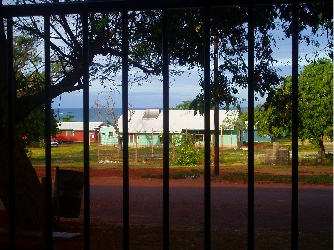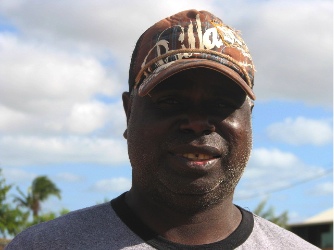Quick Links
Calendar
| | Sun | Mon | Tue | Wed | Thu | Fri | Sat
|
Categories
Archives
XML/RSS Feed
Statistics
Total entries in this blog:
Total entries in this category:
Published On: Dec 03, 2007 01:41 PM
|
The View From Croker Island
It has now been ten days since I arrived on
Croker Island. During that time, John Howard has demonstrated his new found
concern for Aboriginal welfare. I have long held a cynical view of anything
Howard does, and nothing has disturbed me more than his ill disguised contempt
for the Aboriginal people of Australia over the past eleven years. His dismissal
of ill treatment, dispossession, and murder of the past as a "black arm band
view of history," his refusal to acknowledge or to express genuine regret for
the stolen generation, the disbandment of ATSIC leaving Aboriginal people with
no substantial representative body to speak for their rights, are just a few of
the glaring demonstrations of his indifference, if not malice. He has also, of
course, undermined what progress has been gained in cases like Wik, by passing
legislation to undermine those gains. What is the view, in light of Howard's
sudden 'concern' for Aboriginal welfare, from Croker Island?
I have been asked to write something on this
subject by traditional owner Rachael, who I met early in my visit here. I had
been wondering what effect the deluge of information over the last week or so
would have on the sleepy, sunny and laid-back community of Minjilang. Rachael is
the first to approach me directly, and has asked me to write of the concerns, as
she sees it, of the community, something I do not feel qualified to do, being a
mere visitor, albeit researching a positive story of black/white relationship in
this region, 180 years ago. I am writing that story because I think it has
something positive to offer, but it is not what Rachael means when she asks me
to represent her view. I can only comment on what I have seen on my brief visit,
and reflect on how the recent announcements may be affecting the community,
through the eyes of a 'Balanda'.
 There are obvious advantages to living
on an island community, and disadvantages too, the most obvious being the high
cost of transport for everything brought from the mainland, mostly by the weekly
barge. This affects the price of everything, all of the consumer goods; cars
here cost as much to ship as they do to buy. The advantages? I have seen no sign
of grog at all in the ten days I have been here, and it appears that the
isolation may have much to do with that. Within days of my arrival, after
months, if not years of preparation, the controlled use of kava was introduced
to the community. Just yesterday, the Howard government has announced a total
ban on the import of kava, except for traditional (Pacific Islander) use. This
is the kind of wide brush-stroke pronouncement which obviously must be upsetting
communities across the territory. Do problems in some communities mean that it
should be banned in all communities? Should communities who are handling their
grog licenses in a responsible manner have their licenses revoked? Should the
children of Minjilang, some of the happiest and healthy looking children I have
ever seen in an Aboriginal community be subject to some compulsory medical
examination, which may or may not be related to sexual molestation? What message
does that send to responsible parents, who appear to be managing their community
well? If Minjilang is not on the list of communities to be targeted, as seems
likely, why did John Howard announce that every child in the Northern Territory
under the age of sixteen would be examined?
Speaking for myself, I believe that
the Howard Government, indifferent to ill health, lack of housing, education or
respect for the Aboriginal people for eleven years, is using the issue of sexual
molestation to attempt to divide the wider community. I believe he is using the
issue as a form of land grab, as he takes over the administration of townships,
and coupled with his attempts to wrest communal land from communities, he seeks
to dismantle and fragment what is left of traditional culture, deliberately or
indirectly as the consequence of his actions. The people of Croker Island, have
a vibrant beautiful community, despite a dark past when it served as a mission
for the stolen generation, a plaque listing over 200 names bearing testament to
a past when the Balanda thought they knew what they were doing, and got it
wrong. The man who has demonstrated indifference at best, and hostility at worst
throughout his political career towards the Aboriginal people, is now
representing himself as the hero charging in on his white steed to solve all the
problems, in a field where he has demonstrated an overwhelming ignorance. If it
makes me concerned and uncomfortable, what effect does it have on the Aboriginal
community?On a brighter note, I was
able, after nearly two weeks here, to meet with and to have a long discussion
with Stephen Fejo, a resident of Croker Island, and a traditional owner of
Raffles Bay. Stephen actually flew to Darwin around about the time I was flying
into Croker, because of the pending death of a relative in Darwin hospital, and
returned the day I went to Raffles Bay. We viewed the photographs of Iwaidja
people taken in the 1880's I had downloaded into my laptop, and chatted into a
recorder as we did so. He was pleased to view the pics of Fort Wellington I had
taken, and to hear that I had used my GPS to record the location of the
remaining ruins.
There are obvious advantages to living
on an island community, and disadvantages too, the most obvious being the high
cost of transport for everything brought from the mainland, mostly by the weekly
barge. This affects the price of everything, all of the consumer goods; cars
here cost as much to ship as they do to buy. The advantages? I have seen no sign
of grog at all in the ten days I have been here, and it appears that the
isolation may have much to do with that. Within days of my arrival, after
months, if not years of preparation, the controlled use of kava was introduced
to the community. Just yesterday, the Howard government has announced a total
ban on the import of kava, except for traditional (Pacific Islander) use. This
is the kind of wide brush-stroke pronouncement which obviously must be upsetting
communities across the territory. Do problems in some communities mean that it
should be banned in all communities? Should communities who are handling their
grog licenses in a responsible manner have their licenses revoked? Should the
children of Minjilang, some of the happiest and healthy looking children I have
ever seen in an Aboriginal community be subject to some compulsory medical
examination, which may or may not be related to sexual molestation? What message
does that send to responsible parents, who appear to be managing their community
well? If Minjilang is not on the list of communities to be targeted, as seems
likely, why did John Howard announce that every child in the Northern Territory
under the age of sixteen would be examined?
Speaking for myself, I believe that
the Howard Government, indifferent to ill health, lack of housing, education or
respect for the Aboriginal people for eleven years, is using the issue of sexual
molestation to attempt to divide the wider community. I believe he is using the
issue as a form of land grab, as he takes over the administration of townships,
and coupled with his attempts to wrest communal land from communities, he seeks
to dismantle and fragment what is left of traditional culture, deliberately or
indirectly as the consequence of his actions. The people of Croker Island, have
a vibrant beautiful community, despite a dark past when it served as a mission
for the stolen generation, a plaque listing over 200 names bearing testament to
a past when the Balanda thought they knew what they were doing, and got it
wrong. The man who has demonstrated indifference at best, and hostility at worst
throughout his political career towards the Aboriginal people, is now
representing himself as the hero charging in on his white steed to solve all the
problems, in a field where he has demonstrated an overwhelming ignorance. If it
makes me concerned and uncomfortable, what effect does it have on the Aboriginal
community?On a brighter note, I was
able, after nearly two weeks here, to meet with and to have a long discussion
with Stephen Fejo, a resident of Croker Island, and a traditional owner of
Raffles Bay. Stephen actually flew to Darwin around about the time I was flying
into Croker, because of the pending death of a relative in Darwin hospital, and
returned the day I went to Raffles Bay. We viewed the photographs of Iwaidja
people taken in the 1880's I had downloaded into my laptop, and chatted into a
recorder as we did so. He was pleased to view the pics of Fort Wellington I had
taken, and to hear that I had used my GPS to record the location of the
remaining ruins.
 Stephen was also very interested
in the Commandant of
Solitude, the book of Barker's journals, which
documents Barker's daily activities with Stephen's Iwaidja ancestors. I have
left the details with him, and all of the writings I have done (mainly a brief
summary of incidents of relevance from the journals) and photographs I have
taken, and he now knows of my obsessive project. Hopefully we will get together
again sometime to further it.
Stephen was also very interested
in the Commandant of
Solitude, the book of Barker's journals, which
documents Barker's daily activities with Stephen's Iwaidja ancestors. I have
left the details with him, and all of the writings I have done (mainly a brief
summary of incidents of relevance from the journals) and photographs I have
taken, and he now knows of my obsessive project. Hopefully we will get together
again sometime to further it.
Posted: Thu - June 28, 2007 at 12:48 PM
|
